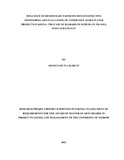| dc.description.abstract | Rural areas are faced with difficulty of water accessibility than in urban areas especially in
Africa, where water collection may a great deal of physical effort, contaminated water sources
posing health problems. Communities in these rural areas have sought to come together and
initiate water projects to alleviate this menace. Tigania west Sub-County which is the scope of
this study is part of the rural Kenya and therefore is faced by the problem of insufficient access
of safe water to a majority of the population. The main objective is to investigate the effect of
beneficiary participation in projects' monitoring and evaluation with a view to seeing how best
they contribute to the sustainability of the project. The main concern here is to ascertain whether
beneficiary involvement in M&E activities contributes to the effective monitoring and evaluation
which equates to sustainability of Community Based water projects. In trying to unravel this
issue the researcher employed to use descriptive survey design and where sample included
respondents from both the members of the water project and the management team. The
sampling method will be random sampling method of 30% members and the management of
Kiabaibate-Nchura water Project. The instruments of data collection used were questionnaires
(both structured and open) that were administered directly by the researcher as guided. Data was
analyzed using descriptive statistics: Frequency distributions and measures of central tendencies
and in particular Likert scale analysis, the results of the survey are presented using tables.The
variable that seemed to affect monitoring and evaluation in the project most was beneficiary
participation in project activities, with beneficiaries demonstrating very poor participation in
project activities, which are, sadly, the very building blocks The research recommends that
reasons be sought for such poor and low participation in project activities, yet the beneficiaries
indicate that the project is beneficial to them. The management should, on regular basis, expose
the beneficiaries to the financial reports for increased transparency and accountability. It is
anticipated that information gathered will enable communities understand the nature of CBWPs
and further support Management committees, Government and donors in the adding value in the
way in which they engage with the CBWPs. It will also put in a voice to many other academic
opinions that makes project execution a learning process. | en_US |

